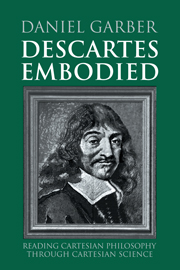Book contents
- Frontmatter
- Contents
- Acknowledgments
- Abbreviations, Citations, and Translations
- Introduction
- Part I Historiographical Preliminaries
- Part II Method, Order, and Certainty
- Part III Mind, Body, and the Laws of Nature
- 7 Mind, Body, and the Laws of Nature in Descartes and Leibniz
- 8 Understanding Interaction: What Descartes Should Have Told Elisabeth
- 9 How God Causes Motion: Descartes, Divine Sustenance, and Occasionalism
- 10 Descartes and Occasionalism
- 11 Semel in vita: The Scientific Background to Descartes' Meditations
- 12 Forms and Qualities in the Sixth Replies
- Part IV Larger Visions
- Sources
- Index
8 - Understanding Interaction: What Descartes Should Have Told Elisabeth
Published online by Cambridge University Press: 10 November 2009
- Frontmatter
- Contents
- Acknowledgments
- Abbreviations, Citations, and Translations
- Introduction
- Part I Historiographical Preliminaries
- Part II Method, Order, and Certainty
- Part III Mind, Body, and the Laws of Nature
- 7 Mind, Body, and the Laws of Nature in Descartes and Leibniz
- 8 Understanding Interaction: What Descartes Should Have Told Elisabeth
- 9 How God Causes Motion: Descartes, Divine Sustenance, and Occasionalism
- 10 Descartes and Occasionalism
- 11 Semel in vita: The Scientific Background to Descartes' Meditations
- 12 Forms and Qualities in the Sixth Replies
- Part IV Larger Visions
- Sources
- Index
Summary
A typical textbook account of the philosophy of mind in the seventeenth century goes something like this. Descartes believed in two kinds of stuff, mental stuff and material stuff, substances distinct in nature that go together to constitute a single human being. But Descartes also took it for granted that these two substances were capable of genuine causal interaction, that minds can cause bodily events, and that bodies can cause mental events, i.e., that acts of will can genuinely cause changes in the state of the human body, and that the state of the sensory organs and the brain can cause sensation and imagination in the mind. But, the story goes, Descartes went astray here and vastly underestimated the philosophical problems inherent in his position. Descartes, it is claimed, repressed, or even worse, simply ignored the central question his position raises: How is it even possible that an immaterial substance, like the mind, could conceivably act on an extended substance like the human body? According to the standard account, later philosophers recognized the inherent unintelligibility of Descartes' position and started one of the largest cottage industries in the history of philosophy, the attempt to provide satisfactory solutions to the mind-body problem, intelligible accounts of how mental and physical events are related to one another. Realizing the unintelligibility of the doctrine of causal interactionism, this cottage industry produced such noteworthy products as occasionalism, dual-aspect theory, pre-established harmony, and so on, all in the attempt to fill in the gap in Descartes' dualist program.
This general outline can (and has) been challenged; the actual history of philosophy is much richer than any of its rationalized reconstructions.
- Type
- Chapter
- Information
- Descartes EmbodiedReading Cartesian Philosophy through Cartesian Science, pp. 168 - 188Publisher: Cambridge University PressPrint publication year: 2000



